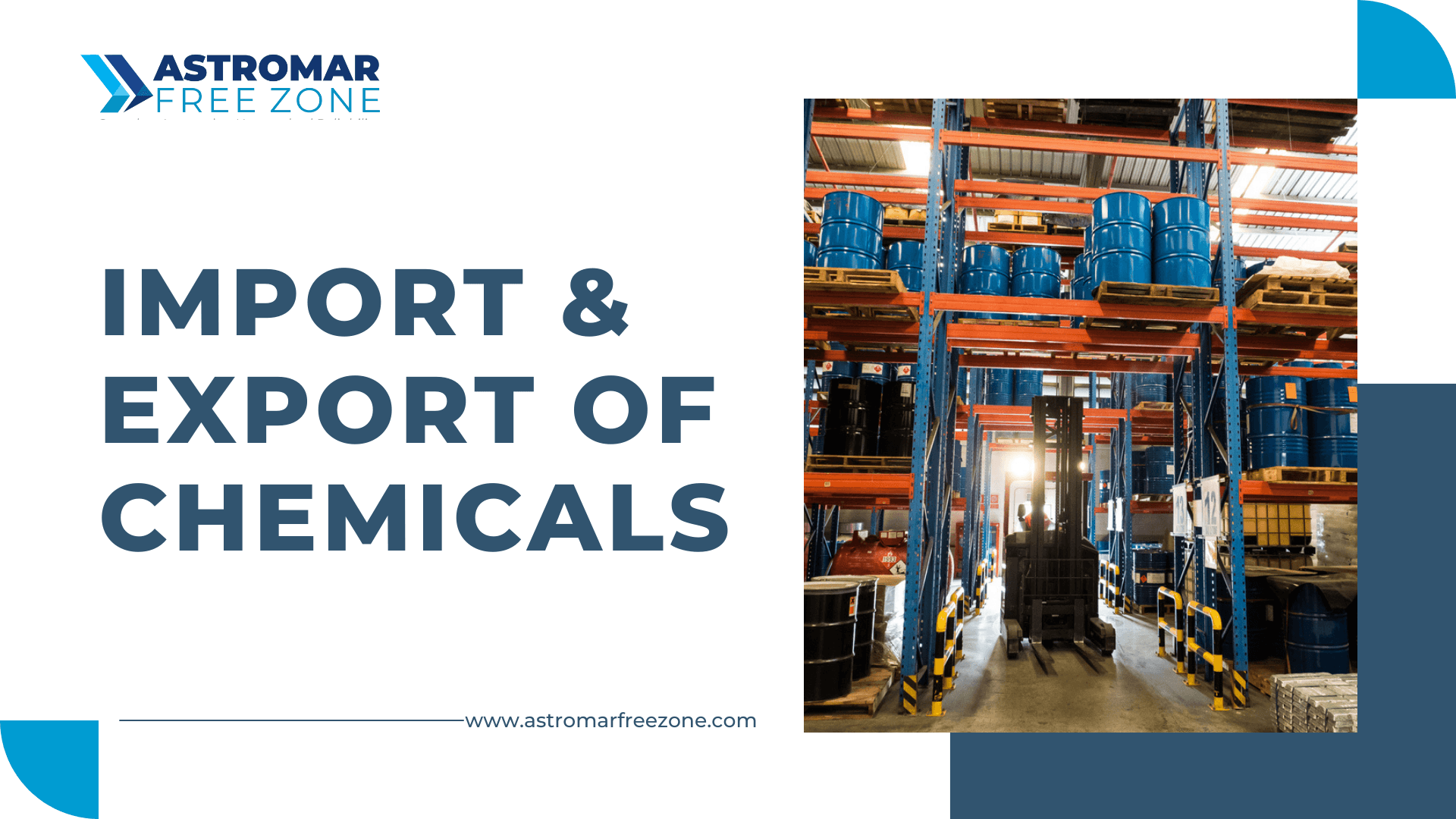


Import Export of Chemicals in India: FTWZ
India is a major player in the global chemical trade, with a robust infrastructure for the import and export of chemicals. The industry is vital for sectors like agriculture, pharmaceuticals, textiles, and manufacturing. In this blog, we’ll explore the dynamics of India’s chemical trade, its challenges, and how businesses can optimize their operations.
Overview of India's Chemical Trade
India’s chemical industry ranks among the largest globally, with a strong presence in bulk chemicals, specialty chemicals, agrochemicals, and petrochemicals. Key highlights include:
Exports: India is a leading exporter of dyes, organic chemicals, and pharmaceuticals intermediates.
Imports: India imports chemicals like crude oil derivatives, specialty chemicals, and advanced materials to meet growing industrial demand.
Challenges in the Import and Export of Chemicals
Regulatory Compliance
Chemical trade involves navigating complex regulations, especially for hazardous materials. Non-compliance can lead to penalties or shipment delays.Logistics and Storage
Chemicals often require temperature-controlled or specialized storage and careful handling during transit. Improper logistics can compromise quality and safety.Fluctuating Global Prices
Volatility in raw material prices and currency fluctuations can affect profitability.Environmental Concerns
Stringent environmental policies demand eco-friendly practices, increasing costs for businesses.
Benefits of Import Export of Chemicals in India
Access to Global Markets
India’s growing infrastructure and FTZs facilitate easy access to international markets for chemical exporters.Increased Efficiency with FTZs
Free Trade Zones offer:Duty-free imports and exports
Streamlined customs clearance
Cost-effective warehousing and storage
Boost to Domestic Industries
Imported specialty chemicals support India’s pharmaceutical, agriculture, and manufacturing sectors, driving innovation and growth.
Best Practices for Chemical Trade
Partner with Experts
Collaborate with logistics providers and FTZ operators like Astromar Freezone for safe storage, efficient customs handling, and reduced costs.Invest in Technology
Use real-time tracking and inventory management tools to ensure smooth operations and minimize delays.Focus on Sustainability
Adopt eco-friendly practices to meet global environmental standards and appeal to environmentally conscious clients.
Astromar Free Trade Zone: Simplifying Chemical Trade
At Astromar FTZ, we provide end-to-end solutions for businesses engaged in the import and export of chemicals. Our services include:
Specialized Warehousing: Temperature-controlled and hazardous material storage.
Customs Clearance: Simplified procedures for faster processing.
Regulatory Support: Guidance on compliance with national and international norms.
With our expertise, businesses can navigate the complexities of chemical trade while reducing costs and ensuring safety.
Conclusion
India’s role in the global import and export of chemicals continues to grow, offering immense opportunities for businesses. By understanding regulatory frameworks, leveraging FTZ benefits, and adopting best practices, companies can optimize their operations and achieve long-term success.
Looking to streamline your chemical trade operations? Visit www.astromarfreezone.com to learn how we can help.
Import Export of Chemicals in India: FTWZ
India is a major player in the global chemical trade, with a robust infrastructure for the import and export of chemicals. The industry is vital for sectors like agriculture, pharmaceuticals, textiles, and manufacturing. In this blog, we’ll explore the dynamics of India’s chemical trade, its challenges, and how businesses can optimize their operations.
Overview of India's Chemical Trade
India’s chemical industry ranks among the largest globally, with a strong presence in bulk chemicals, specialty chemicals, agrochemicals, and petrochemicals. Key highlights include:
Exports: India is a leading exporter of dyes, organic chemicals, and pharmaceuticals intermediates.
Imports: India imports chemicals like crude oil derivatives, specialty chemicals, and advanced materials to meet growing industrial demand.
Challenges in the Import and Export of Chemicals
Regulatory Compliance
Chemical trade involves navigating complex regulations, especially for hazardous materials. Non-compliance can lead to penalties or shipment delays.Logistics and Storage
Chemicals often require temperature-controlled or specialized storage and careful handling during transit. Improper logistics can compromise quality and safety.Fluctuating Global Prices
Volatility in raw material prices and currency fluctuations can affect profitability.Environmental Concerns
Stringent environmental policies demand eco-friendly practices, increasing costs for businesses.
Benefits of Import Export of Chemicals in India
Access to Global Markets
India’s growing infrastructure and FTZs facilitate easy access to international markets for chemical exporters.Increased Efficiency with FTZs
Free Trade Zones offer:Duty-free imports and exports
Streamlined customs clearance
Cost-effective warehousing and storage
Boost to Domestic Industries
Imported specialty chemicals support India’s pharmaceutical, agriculture, and manufacturing sectors, driving innovation and growth.
Best Practices for Chemical Trade
Partner with Experts
Collaborate with logistics providers and FTZ operators like Astromar Freezone for safe storage, efficient customs handling, and reduced costs.Invest in Technology
Use real-time tracking and inventory management tools to ensure smooth operations and minimize delays.Focus on Sustainability
Adopt eco-friendly practices to meet global environmental standards and appeal to environmentally conscious clients.
Astromar Free Trade Zone: Simplifying Chemical Trade
At Astromar FTZ, we provide end-to-end solutions for businesses engaged in the import and export of chemicals. Our services include:
Specialized Warehousing: Temperature-controlled and hazardous material storage.
Customs Clearance: Simplified procedures for faster processing.
Regulatory Support: Guidance on compliance with national and international norms.
With our expertise, businesses can navigate the complexities of chemical trade while reducing costs and ensuring safety.
Conclusion
India’s role in the global import and export of chemicals continues to grow, offering immense opportunities for businesses. By understanding regulatory frameworks, leveraging FTZ benefits, and adopting best practices, companies can optimize their operations and achieve long-term success.
Looking to streamline your chemical trade operations? Visit www.astromarfreezone.com to learn how we can help.
Import Export of Chemicals in India: FTWZ
India is a major player in the global chemical trade, with a robust infrastructure for the import and export of chemicals. The industry is vital for sectors like agriculture, pharmaceuticals, textiles, and manufacturing. In this blog, we’ll explore the dynamics of India’s chemical trade, its challenges, and how businesses can optimize their operations.
Overview of India's Chemical Trade
India’s chemical industry ranks among the largest globally, with a strong presence in bulk chemicals, specialty chemicals, agrochemicals, and petrochemicals. Key highlights include:
Exports: India is a leading exporter of dyes, organic chemicals, and pharmaceuticals intermediates.
Imports: India imports chemicals like crude oil derivatives, specialty chemicals, and advanced materials to meet growing industrial demand.
Challenges in the Import and Export of Chemicals
Regulatory Compliance
Chemical trade involves navigating complex regulations, especially for hazardous materials. Non-compliance can lead to penalties or shipment delays.Logistics and Storage
Chemicals often require temperature-controlled or specialized storage and careful handling during transit. Improper logistics can compromise quality and safety.Fluctuating Global Prices
Volatility in raw material prices and currency fluctuations can affect profitability.Environmental Concerns
Stringent environmental policies demand eco-friendly practices, increasing costs for businesses.
Benefits of Import Export of Chemicals in India
Access to Global Markets
India’s growing infrastructure and FTZs facilitate easy access to international markets for chemical exporters.Increased Efficiency with FTZs
Free Trade Zones offer:Duty-free imports and exports
Streamlined customs clearance
Cost-effective warehousing and storage
Boost to Domestic Industries
Imported specialty chemicals support India’s pharmaceutical, agriculture, and manufacturing sectors, driving innovation and growth.
Best Practices for Chemical Trade
Partner with Experts
Collaborate with logistics providers and FTZ operators like Astromar Freezone for safe storage, efficient customs handling, and reduced costs.Invest in Technology
Use real-time tracking and inventory management tools to ensure smooth operations and minimize delays.Focus on Sustainability
Adopt eco-friendly practices to meet global environmental standards and appeal to environmentally conscious clients.
Astromar Free Trade Zone: Simplifying Chemical Trade
At Astromar FTZ, we provide end-to-end solutions for businesses engaged in the import and export of chemicals. Our services include:
Specialized Warehousing: Temperature-controlled and hazardous material storage.
Customs Clearance: Simplified procedures for faster processing.
Regulatory Support: Guidance on compliance with national and international norms.
With our expertise, businesses can navigate the complexities of chemical trade while reducing costs and ensuring safety.
Conclusion
India’s role in the global import and export of chemicals continues to grow, offering immense opportunities for businesses. By understanding regulatory frameworks, leveraging FTZ benefits, and adopting best practices, companies can optimize their operations and achieve long-term success.
Looking to streamline your chemical trade operations? Visit www.astromarfreezone.com to learn how we can help.






